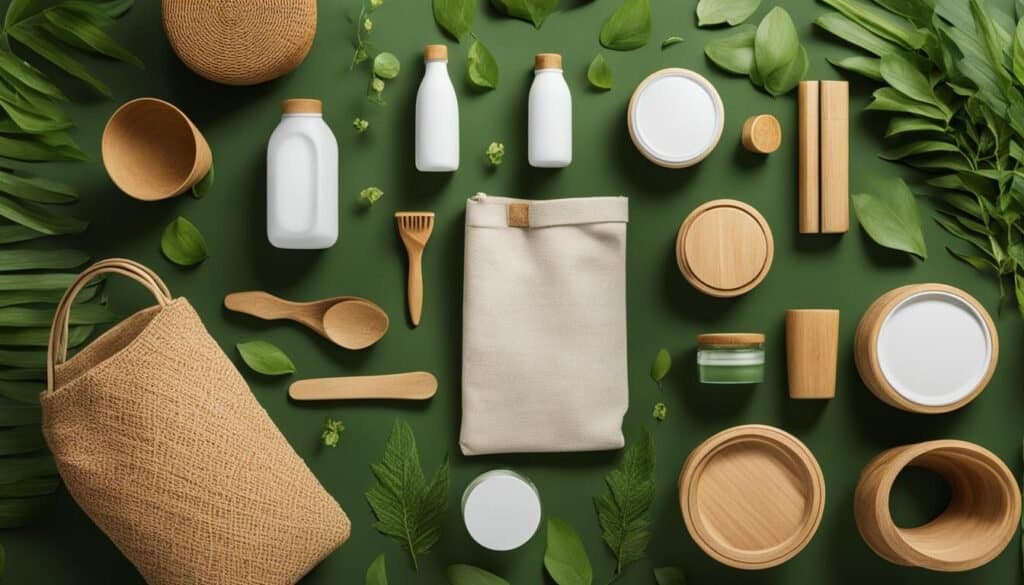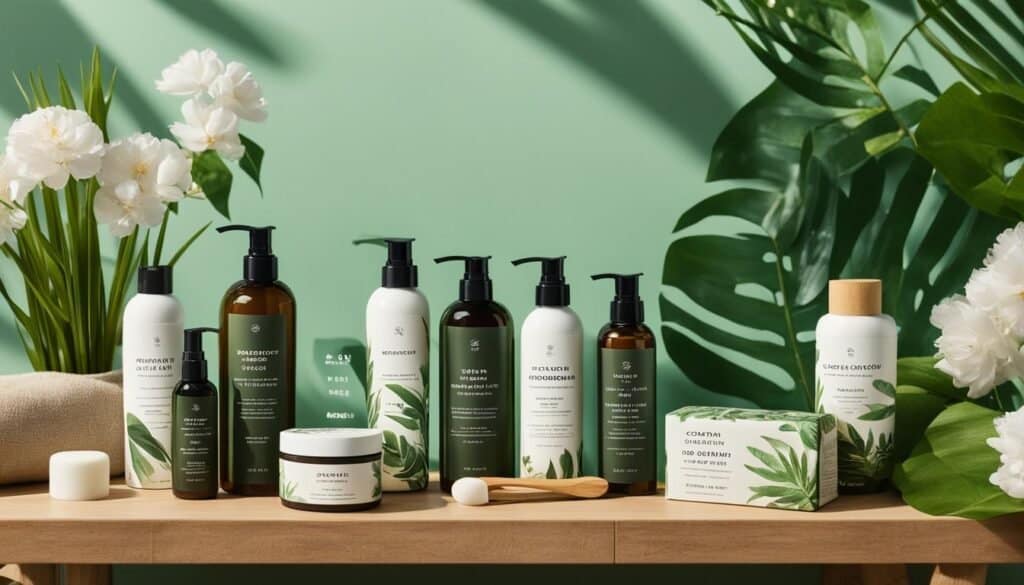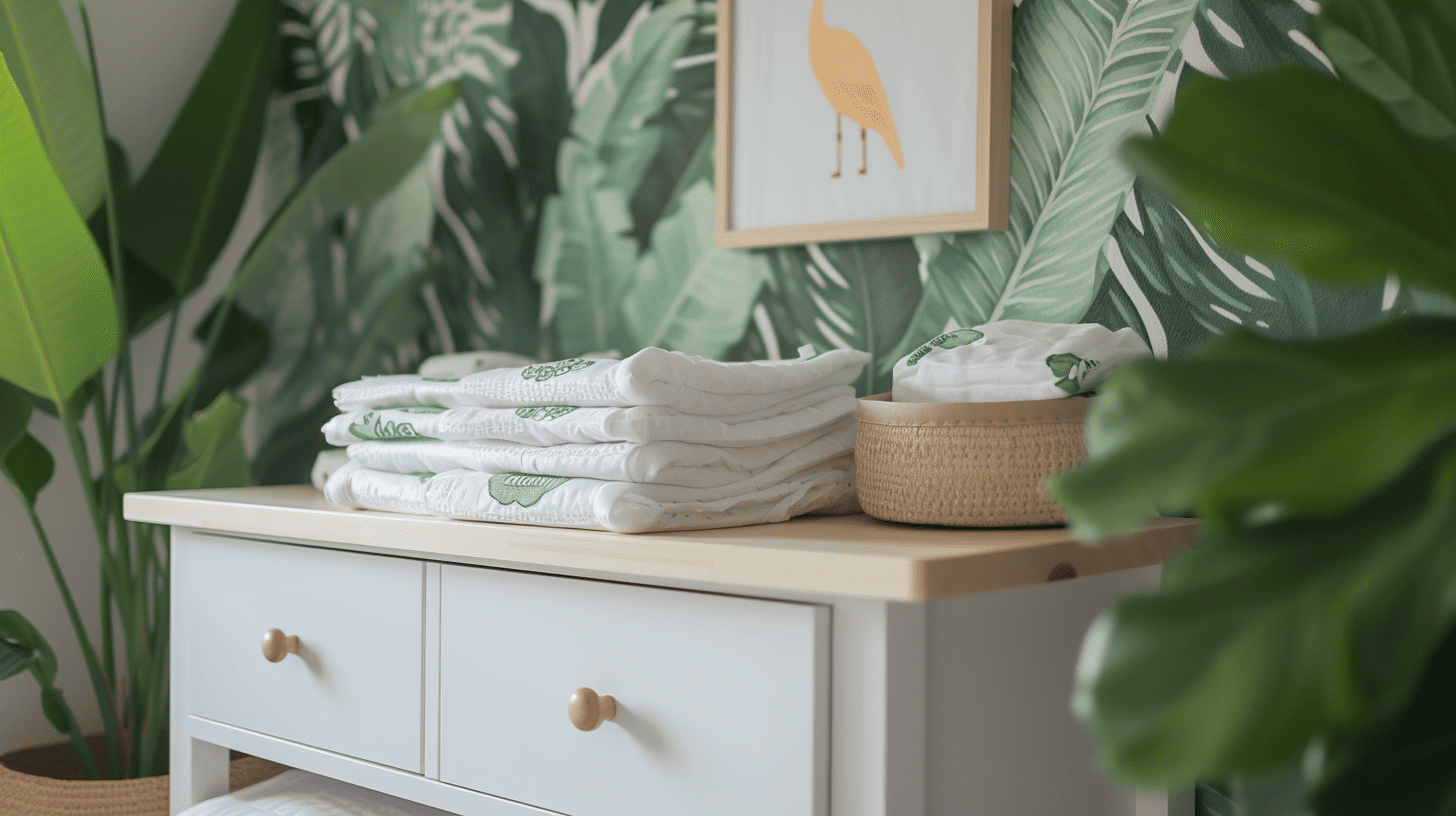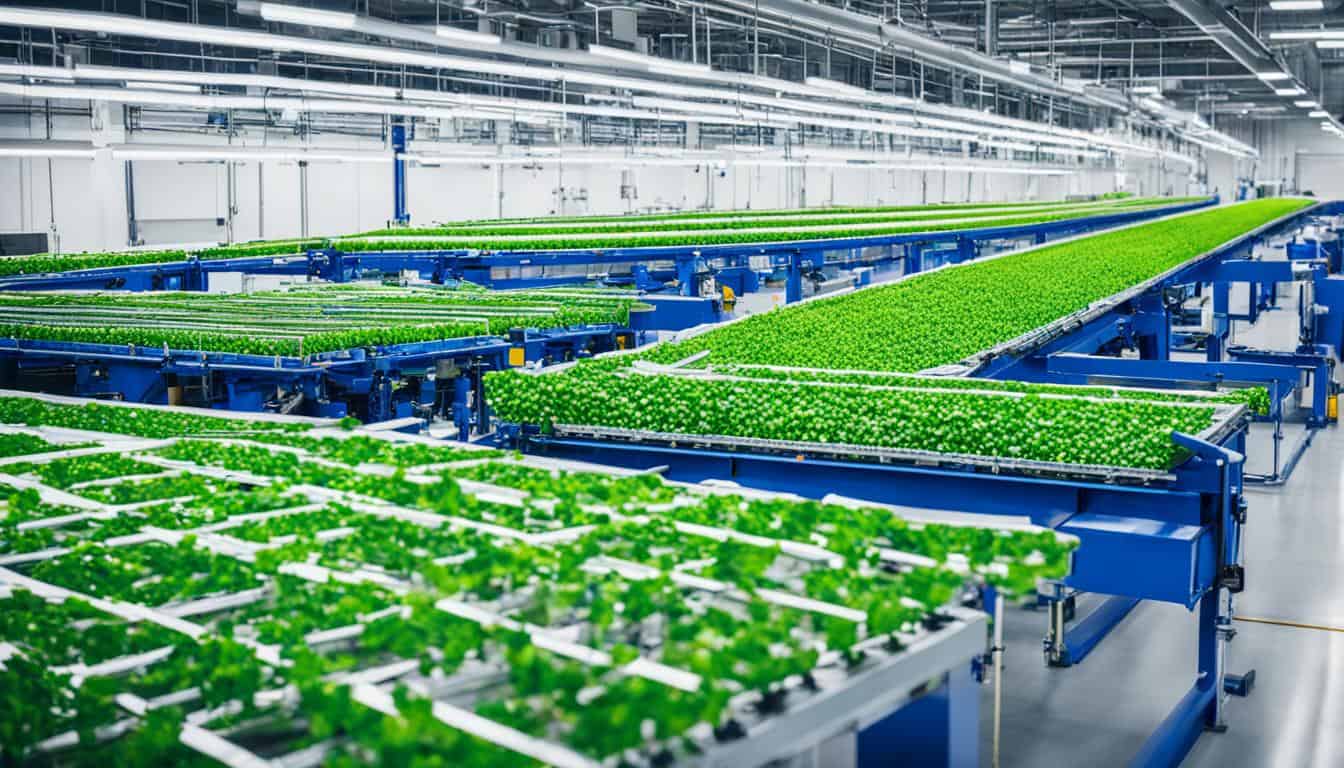My journey towards a zero waste living began with a shift in perspective—a realization that reducing my consumption, adapting my habits, and embracing biodegradable products are essential steps in creating a more sustainable lifestyle. It’s impossible to change overnight, but every choice for a more earth-friendly item, every eco-conscious decision to live greener, and each compostable good replace single-use alternatives that otherwise add to landfills.
Key Takeaways
- Biodegradable products support zero waste living by reducing consumption and single-use materials.
- Compostable goods minimize landfill clutter and facilitate the transition to a sustainable lifestyle.
- A comprehensive approach to environmental stewardship includes understanding and adopting sustainable practices in everyday life.
- A zero waste journey is a continuous process that requires patience, commitment, and incremental changes.
- Both small and large eco-conscious choices contribute to a significant positive impact on the environment.
101 Biodegradable Products for Zero Waste
- Compostable Foodware
- Compostable plates, bowls, cups, and cutlery
- By 2025, it’s estimated that 103 million tons of disposable foodware will end up in landfills annually (Source: Eco-Cycle & Upstream)
- Tip: Look for items labeled compostable that meet ASTM D6400 or D6868 standards
- Edible Cutlery
- Cutlery made of edible ingredients like wheat bran, rice bran, sorghum flour, etc.
- Edible cutlery has 83% lower carbon footprint compared to plastic cutlery (Source: Bakeys)
- Tip: Choose sturdy ones to avoid cracking and carry necessary tissues/napkins
- Reusable Food Wraps
- Beeswax wraps and washable silicone bags
- Reusable food wraps generate 68% less waste vs disposable wraps (Source: Greenpeace)
- Tip: Clean wraps with cold water and mild soap and let them air dry after each use
- Natural Cleaning Products
- Biodegradable all-purpose cleaner, fabric softener, dish soap, etc.
- 45% of conventional cleaning products contain chemicals toxic to aquatic life (Source: EWG)
- Tip: Look for plant-based ingredients and Safer Choice labeled products
- Personal Care Products
- Biodegradable shampoo bars, conditioner bars, lotion bars, facial scrub, etc.
- a. Over 120 billion units of packaging are produced annually by the personal care industry (Source: Zero Waste Week)
- Tip: Opt for naked products without plastic packaging
- Stain Removing Products
- Biodegradable enzyme-based stain removers, fabric fresheners
- Enzyme-based stain removers degrade within 28 days as per OECD 301B standards
- Tip: Spot test stain removers on inconspicuous part of fabric before use
- Sustainable Textiles & Apparel
- a. Fabrics and clothing made using organic cotton, bamboo, other natural fibers
- Approximately 73% of the world’s clothing eventually ends up in landfills (Source: Earth.Org)
- Tip: Purchase high-quality clothing and repair, repurpose, and recycle apparel instead of throwing away
- Wood & Grass Alternatives to Plastics
- Cutlery, straws, combs made of wood and bamboo grass
- Wood/bamboo-based biodegradable plastics decompose 1.5x faster over plastic (Source: ScienceDirect)
- Tip: Opt for FSC Certified wood sources and fast-growing bamboo grass species
- Other Compostable Alternatives
- Plant starch-based bin liners, dog poop bags, adhesive tapes
- a. About 17 billion pounds of plastic trash enters the ocean every year (Source: Plastic Pollution Coalition)
- Tip: Ensure proper composting facilities exist in your municipality before purchasing
- Eco-Conscious Bags & Bins
- Jute bags, cotton tote bags, compost bins, recycling bins, etc.
- Reusable shopping bags have an average lifespan of 15 years (Source: 1 Million Women)
- Tip: Machine wash cotton tote bags post grocery/veggie shopping to prevent bacterial growth
- Bioplastic Utensils & Tableware
- PLA Bioplastic based cups, spoons, forks, knives, etc.
- Bioplastics take 3-6 months to biodegrade unlike 1000+ years for conventional plastics (Source: European Bioplastics)
- Tip: Ensure discarding as per municipality guidelines to enable proper composting
- Natural Air Fresheners
- Essential oil based air freshener sprays, soy candles, incense sticks, etc.
- About 50% of conventional air fresheners contain phthalates banned in many countries (Source: Natural Resources Defense Council)
- Tip: Never burn soy candles unattended and ensure enough ventilation when in use
- Eco-Friendly Water Bottles
- Reusable glass, copper, bamboo bottles with replaceable bio-based filters
- Only about 9% of plastic is recycled in the US presently (Source: National Geographic)
- Tip: Check if manufacturer offers buy-back/discount programs before purchase
- Safety Products
- Bioplastic gloves, organic cotton masks, zero waste first aid kits, etc.
- Over 193 billion disposable masks entered the waste stream in 2020 alone (Source: Environmental Science & Technology)
- Tip: Reuse cotton masks multiple times and replace filters when required
- Eco-Friendly Sponges
- Reusable loofah sponges, tampico fiber pot scrubs, cellulose scrub sponges, etc.
- Natural sponges reduce over 13,800 tons of plastic pollution each year (Source: World Wildlife Fund)
- Tip: Discard old sponges in municipal compost bins and avoid using with harsh chemicals
- Reusable Food Wraps
- Beeswax wraps and washable silicone bags
- Reusable food wraps generate 68% less waste vs disposable wraps (Source: Greenpeace)
- Tip: Clean wraps with cold water and mild soap and let them air dry after each use
- Eco-Friendly Wet Wipes
- Plant fiber or bamboo viscose based biodegradable wet wipes
- About 93% of US wet wipes contain plastic that end up in oceans and rivers (Source: Water Environment Federation)
- Tip: Avoid disposing down the toilet and discard used wipes in compost bins instead
- Natural Laundry Supplies
- Eco-friendly laundry detergent, whitening bars, stain removers, etc.
- 1 bottle of laundry detergent contains about 30-40% plastic packaging (Source: Going Zero Waste)
- Tip: Check for plant-based ingredients and opt for packaging free solid versions
- Eco-Conscious Kitchenware
- Reusable silicone ziplock bags, steel/glass straws, vegetable scrubbers, etc.
- Each person in the US uses about 2,000 plastic straws per year (Source: National Parks Service)
- Tip: Handwash stainless steel items using natural dish soap and soft sponge
- Garden Products
- Bioplastic plant pots, organic fertilizers, bamboo water sprayers, etc.
- U.S. landfills receive over 1.4 billion plastic plant pots annually (Source: Horticulture Research)
- Tip: Check online groups for used plastic pots before purchase
- Pet Supplies
- Vegan pet food, organic pet shampoo, bamboo pet bowls/toys, etc.
- US pet food industry generates approx. 758,000 tons of plastic packaging per year (Source: Pet Sustainability Coalition)
- Tip: Look for BPA-free stainless steel bowls and plant-based ingredients
- Office Supplies
- Recycled paper, bamboo pens, wooden rulers, natural glue sticks, etc.
- About 40% of the paper Americans use is not recycled after use (Source: Scientific American)
- Tip: Print/Photocopy double sided whenever possible
- Mattresses & Beddings
- Latex/organic cotton mattresses, bamboo fiber bedsheets, etc.
- Over 20 million mattresses are disposed annually in the US (Source: Mattress Recycling Council)
- Tip: Donate used mattresses that are in good condition
- Furniture
- Upcycled furniture from scrap/reclaimed wood
- Upcycling saves over 21,000 tons of waste entering landfills annually (Source: RecycleNation)
- Tip: Opt for multifunctional pieces to maximize space utilization
- Electronics Accessories
- Wooden phone cases, plant fiber chargers, vegetable dye cables, etc.
- E-waste is growing 3 times faster than other municipal waste streams (Source: Sustainability Times)
- Tip: Check for buy-back/exchange offers before purchasing accessories
- Eco-Friendly Batteries
- Rechargeable batteries, biodegradable zinc carbon batteries, etc.
- About 5 billion single-use batteries end up in US landfills yearly (Source: Call2Recycle)
- Tip: Recycle used single-use and rechargeable batteries responsibly
- Lighting Products
- Solar garden lights, soy wax candles, natural fiber lamp shades, etc.
- Candles contain paraffin wax made from non-renewable petroleum (Source: The Candlemakers Store)
- Tip: Place soy candles in heat-safe holders on flat surfaces away from drafts
- Natural Paints
- Milk paint, plant oil based paints, natural plant dyes, etc.
- Most conventional paints contain VOCs that can cause headaches and nausea (Source: Healthline)
- Tip: Opt for odorless plant oil based paints with weaker fumes
- Handicraft Supplies
- Wooden beads, reusable silicon molds, recycled yarn, natural dyes, etc.
- Recycling 1 ton of wool saves 20,550 gallons of water (Source: Woolmark Company)
- Tip: Check second-hand stores for unused craft supplies before purchase
- Eco-Friendly Garden Tools
- Bamboo handled trowels, steel weeding tools with wood handles, coir kneeling pads, etc.
- About 400 million plastic garden tool sets are sold globally per year (Source: APLF Limited)
- Tip: Wipe wooden handles clean and store tools away from harsh weather
- Natural Healthcare Products
- Herbal supplements, plant-based antibiotics, compostable cotton swabs, etc.
- Most generic antibiotic pills contain about 80% plasticizers as fillers (Source: Annals of Medicine)
- Tip: Check with your physician before beginning any new medication
- Sustainable Baby Products
- Wooden toys, organic cloth diapers, plant-based baby wipes, etc.
- 90% of baby food pouches contain plastic laminates that leech into food (Source: Tampax)
- Tip: Opt for glass baby bottles with silicone sleeves instead of plastic
- Eco-Friendly Shoes & Bags
- Footwear and bags made using recycled fabric, natural cork, bamboo, etc.
- The average American throws away over 68 pounds of textiles per year (Source: Standard Fiber)
- Tip: Stuff bags with newspaper while storing to retain shape
- Natural Thermometers
- Glass thermometers with metal and organic dye pigments
- Over 3.3 million tons of plastic medical waste is produced by US healthcare sector (Source: ASME)
- Tip: Place glass thermometers securely while storing and avoid subjecting them to shock
- Eco-Friendly Bandages
- Bamboo fiber strips bandages with plant starch adhesive
- There are over 2 billion single use bandages used yearly just in North America (Source: Healthcare Packaging)
- Tip: Apply gently on wounds and discard responsibly after use
- Biodegradable Trash Bags
- Plant starch, jute fiber based trash bags
- 13 million tons of plastic trash enters the ocean every year (Source: Plastic Pollution Coalition)
- Tip: Reuse biodegradable trash bags unless soiled or contaminated
- Natural Dental Care
- Bamboo toothbrushes, neem datun sticks, compostable floss picks, etc.
- 20 billion toothbrushes end up in US landfills every year (Source: The Financial Express)
- Tip: Allow bamboo brushes to air dry before next use to prevent bacterial growth
- Eco-Friendly Medications
- Turmeric capsules, plant-based supplements, vegan gummies/lozenges
- 70% of all antibiotics sold in the US are used on farms and cattle (Source: GRACE Communications Foundation)
- Tip: Check with your physician before beginning any new medication
- Natural Feminine Care
- Organic cotton sanitary pads, reusable silicone menstrual cups, etc.
- Over 5,000 pads/tampons per woman end up in landfills over lifetime (Source: National Geographic)
- Tip: Wash and sanitize menstrual cups thoroughly before/after each cycle
- Zero Waste Birth Control
- Hormone-free copper IUDs, cervical caps made of natural rubber latex, etc.
- 1.5 million tons of plastic waste is generated yearly by the contraception industry (Source: William & Mary Law School)
- Tip: Check for latex sensitivity before opting for latex-based barrier methods
- Eco-Friendly Sun Protection
- Zinc oxide and titanium dioxide mineral sunscreens , hats made from hemp, etc.
- About 14,000 tons of sunscreen ends up in coral reefs globally per year (Source: PNAS)
- Tip: Apply liberally 15-30 mins before sun exposure and reapply every 2 hours
- Natural Insect Repellents
- Essential citronella oils, lavender oils, eucalyptus oils, etc.
- DEET is considered harmful for environment and aquatic life (Source: Beyond Pesticides)
- Tip: Reapply botanical insect repellents more frequently as effectiveness reduces quicker
- Eco-Friendly Lubricants
- Natural oil-based lubricants, aloe vera gel, etc.
- 70% of women use petroleum based lubricants that can cause irritation (Source: Goop)
- Tip: Always check ingredients for sensitivities before purchase
- Zero Waste Intimate Care
- Menstrual underwear, reusable panty liners, organic cotton tampons, etc.
- About 1.5 disposable menstrual product is flushed by 76% women (Source: National Geographic)
- Tip: Wrap used disposables securely before throwing in trash
- Natural Beauty/Skincare
- Shampoo bars, bamboo face scrubbers, konjac sponges, silicone facial brushes, etc.
- About 120 billion packaging units produced annually by personal care industry (Source: Zero Waste Week)
- Tip: Spot test any new skincare on smaller skin area before full use
- Eco-Denture Care Products
- Bamboo toothbrush, natural adhesive strips, bioplastics based denture cleaners
- 14 billion plastic toothbrushes have ended up in US landfills since the 1950s (Source: Statista)
- Tip: Brush & rinse dentures thoroughly before soaking; avoid hot water
- Sustainable Gardening
- Biodegradable plant pots, natural compost fertilizers, organic seeds, etc.
- About 1.4 billion plant pots end up in US landfills yearly (Source: Horticulture Research)
- Tip: Check online groups for used plastic pots before purchase
- Eco-Friendly Groceries
- Reusable cloth produce bags, homemade cleaners, plastic-free tea bags, etc.
- About 10% of all plastic ends up in oceans as grocery & food packaging (Source: Pew Trusts)
- Tip: Bring own containers for deli, butcher etc to avoid plastic wraps
- Natural Clothing Dyes
- Plant-based fabric dyes like turmeric, indigo, madder, oak bark, etc.
- It takes approx 700 gallons of water to dye one pair of jeans indigo blue (Source: ScienceDirect)
- Tip: Thoroughly wash out fabrics after dyeing to avoid later bleeding
- Eco-Friendly Sports Gear
- Cork yoga mats, bamboo sportswear, natural rubber exercise bands, etc.
- About 8 million tons of plastic enters oceans yearly from textiles industry (Source: IUCN)
- Tip: Wash sweat-absorbent gear frequently to prevent bacterial buildup
- Sustainable Backpacks
- Backpacks made using recycled PET bottles, organic cotton, jute, etc.
- In 2019, the global backpacks market was 489,000 tons valued at $23.15 billion (Source: Mordor Intelligence)
- Tip: Use mild cleaners and let bags air dry instead of machine drying
- Eco-Friendly Flasks
- Stainless steel & glass water bottles with neoprene sleeves
- About 38 billion plastic water bottles end up in US landfills every year (Source: Save the WaterTM)
- Tip: Opt for BPA-free and sweat-proof sleeves; handwash & air dry
- Reusable Food Storage Bags
- Silicone storage bags, stainless steel lunch boxes, glass meal prep containers
- Americans use about 100 billion plastic bags annually resulting in plastic pollution (Source: The Last Beach Cleanup)
- Tip: Ensure containers are BPA-free; discard if worn out over time
- Safety Razors & Blades
- Double edge safety razor handles, stainless steel razor blades
- Plastic constitutes up to 99% by weight in disposable razors (Source: Dorco)
- Tip: Rinse razor blades thoroughly before changing to avoid corrosion
- Shaving Brushes
- Brushes with replaceable heads made of boar hair/horsetail hair/synthetic fibers
- About 2 billion disposable razor heads end up in landfills globally per year (Source: Kaitiaki Arataki)
- Tip: Replace brush heads once fraying is visible and sterilize weekly
- Natural Shave/Beard Products
- Shaving cream, oil, wax made from plant oils like coconut oil, shea butter, etc.
- 70% of men’s grooming products contain ingredients like parabens, sulfates, pthalates etc (Source: Bustle)
- Tip: Spot test products if you have sensitive skin
- Eco-Friendly Oral Care
- Bamboo toothbrushes, dental floss, vegan mouthwash tablets, tongue scrapers
- 20 billion plastic toothbrushes have ended up in US landfills since the 1950s (Source: Statista)
- Tip: Rinse oral care items thoroughly before and after each use
- Natural Deodorants
- Baking soda, arrowroot powder, coconut oil based deodorant creams/sticks/sprays
- Most antiperspirants and deodorants contain aluminum which can be absorbed into the body (Source: Breast Cancer Prevention Partners)
- Tip: Apply deodorant only on clean underarms; small batches using glass jars
- Eco-Friendly Oral Healthcare
- Natural tooth powder, vegan dental floss, biodegradable toothbrushes, etc
- 14 billion plastic toothbrushes have ended up in US landfills since the 1950s (Source: Statista)
- Tip: Soak bamboo brushes in hydrogen peroxide to sanitize; air dry
- Shampoo & Conditioner Bars
- Castile soap, plant oils, butters, and herbs based solid shampoo bars
- About 120 billion units of packaging created yearly by personal care industry (Source: Zero Waste Week)
- Tip: Opt for naked zero waste options not packaged in paper or cardboard
- Natural Bug Sprays
- Essential oils like citronella, peppermint, cedarwood based bug repellent sprays
- DEET present in chemical bug sprays is toxic for environment and aquatic life (Source: Beyond Pesticides)
- Tip: Reapply natural bug sprays more frequently as effectiveness reduces quicker
- Eco-Friendly Bandages & Gauze
- Bamboo fiber first aid strips, plant starch based medical tape, organic cotton pads & balls
- There are over 2 billion single use bandages used yearly in North America (Source: Healthcare Packaging)
- Tip: Apply gently; discard responsibly after use
- Reusable Produce Bags
- Mesh and muslin drawstring bags for fruits, vegetables, bulk items, etc.
- US supermarkets hand out over 100 billion plastic grocery bags per year (Source: Worldwatch Institute)
- Tip: Machine wash reusable mesh/muslin bags before reuse
- Safety Razors & Blades
- Double edge safety razor handles, stainless steel razor blades
- Plastic constitutes up to 99% by weight in disposable razors (Source: Dorco)
- Tip: Rinse razor blades thoroughly before changing to avoid corrosion
- Eco-Friendly Water Filters
- Activated charcoal stick filters, reusable fruit infuser water bottles with plant filters
- Globally about 1 million plastic bottles are purchased every minute (Source: The Guardian)
- Tip: Replace reusable fruit infuser sticks every 2-3 months
- Wooden Combs & Brushes
- Handmade removable/replaceable wooden combs, boar bristle hair brushes
- About 1 billion non-recyclable hair brushes end up in landfills annually (Source: Greenpedia)
- Tip: Discard old brush heads responsibly once worn out
- Safety Matches
- Wooden safety matchsticks in cardboard matchboxes
- Most matchsticks are made of non-renewable materials like petroleum based wax (Source: ThoughtCo)
- Tip: Extinguish used matches properly in water; reuse matchboxes
- Beeswax Food Wraps
- Reusable cotton sheets infused with beeswax as alternative to plastic wraps
- About 1 million plastic bags are used globally every minute (Source: Worldwatch Institute)
- Tip: Spot clean with cold water & mild soap; store in breathable container
- Wooden Toothbrushes
- Toothbrushes with replaceable heads made of biodegradable bamboo
- 20 billion plastic toothbrushes have ended up in US landfills since 1950s (Source: Statista)
- Tip: Allow to air dry thoroughly between uses to prevent mold
- Organic Lip Balm & Glosses
- Beeswax, plant oils, butters and waxes based tinted lip balms
- Most store bought lip products contain petroleum derivatives (Source: Whole People)
- Tip: Apply liberally before bedtime; store in cool area away from direct sunlight
- Recycled Paper Products
- Notebooks, toilet paper rolls, paper towels, tissues, made of 100% post-consumer recycled paper
- About 40% of the paper Americans use are not recycled after use (Source: Scientific American)
- Tip: Print double-sided; reuse scrap paper before recycling
- Natural Crayons
- Plant wax-based crayons in paper wrappers or cardboard boxes
- Most crayons contain petroleum-derived paraffin wax (Source: Candle Science)
- Tip: Recycle or compost discarded paper wrappers responsibly
- Eco-Friendly Balloons
- Natural rubber latex balloons can biodegrade unlike plastic balloons
- About 11 billion non-biodegradable balloons end up in oceans yearly (Source: The Balloon Council)
- Tip: Clip ribbons to prevent tangling wildlife after release
- Natural Glues & Tapes
- Plant starch based reusable adhesive tapes, organic flours & starches based pastes
- Most commercial glues contain volatile chemicals found in fossil fuels (Source: Networx)
- Tip: Never use natural glues internally or on open wounds
- Firestarters & Tinders
- Wood wool fire starters, biodegradable wax & sawdust mixtures as firelighters
- Most commercial firestarters contain chemicals like petroleum byproducts (Source: Survival Freedom)
- Tip: Store fire lighting aids in cool, dry area; use carefully
- Sustainable Party Supplies
- Bioplastic straws, plant-based biodegradable confetti, recycled fabric pennants
- US events generate about 25,000 tons of plastic waste from balloons and confetti (Source: Eco-Age)
- Tip: Opt for multipurpose decor to reduce specialty event waste
- Eco-Friendly Gift Wraps
- Washable silk wraps, reusable cotton gift bags, plant fiber ribbons, craft paper
- Annually about 4 million tons of gift wrap ends up in US landfills (Source: Stanford Magazine)
- Tip: Wrap creatively using scarves, bandanas, newspapers, old maps, etc.
- Natural Candles
- Beeswax, soy wax or plant-based gel candles in reusable glass jars
- US throws away around 35 million tons of plastic waste from containers & packaging yearly (Source: Clean Water Action)
- Tip: Never keep burning candle unattended or near drafts
- Sustainable Party Balloons
- Natural rubber latex balloons are biodegradable unlike plastic balloons
- About 11 billion plastic balloons end up in oceans around the world each year (Source: Balloon Council)
- Tip: Clip ribbons to prevent tangling wildlife after release
- Eco-Friendly Medications
- Turmeric capsules, omega 3 capsules, plant-based supplements
- 70% of all antibiotics sold in the US are used on livestock and poultry farms (Source: GRACE Communications)
- Tip: Check with physician before beginning any new medications
- Natural Dental Care
- Neem datun, miswak sticks, silk dental floss, charcoal powder
- About 20 billion plastic toothbrushes have ended up in US landfills since the 1950s (Source: Statista)
- Tip: Rinse oral care items before and after each use
- Eco-Friendly Flip Flops
- Flip flops made using recycled rubber, cotton straps, bamboo fibers
- About 3 billion pairs of rubber flip flops end up in landfills each year globally (Source: UNEP)
- Tip: Spot clean straps with mild detergent and discarded responsibly when worn out
- Wood Wick Candles
- Natural soy/beeswax candles with wood wicks that crackle while burning
- Most candles contain paraffin wax that comes from non-renewable petroleum (Source: The Candlemakers Store)
- Tip: Never leave burning candles unattended or near drafts
- Natural Body Scrubs
- Organic sugar/salt, plant oils, essential oils based scrubs for face and body
- Many cosmetic scrubs contain microplastics that pollute waterways (Source: 5 Gyres Institute)
- Tip: Use gently to exfoliate; start with softer homemade versions
- Shampoo Bars
- Castile soap, plant oils and butters based solid shampoo bars
- About 120 billion units of packaging created yearly by personal care industry (Source: Zero Waste Week)
- Tip: Opt for naked zero waste options not packaged in paper or cardboard
- Wooden Eyewear
- Biodegradable frames made of wood, bamboo biomass and recycled materials
- Over 140 million plastic eyewear units are discarded in US landfills annually (Source: Optical Magazine)
- Tip: Wipe wooden frames clean with dry cloth; store in protective case
- Natural Condoms
- Non-hormonal condoms made of biodegradable natural rubber latex
- Most synthetic rubber latex condoms take 1000+ years to decompose (Source: Department of Health)
- Tip: Always check latex sensitivity before use
- Reusable Food Savers
- Silicone stretch lids, stainless steel containers with rubber seals
- Americans throw out about 25% more waste during Thanksgiving (Source: Stanford Magazine)
- Tip: Ensure items are BPA-free; handwash & air dry thoroughly
- Eco-Friendly Cutting Boards
- Reversible bamboo boards with grooves to collect juices
- About 8% of landfill waste comes from plastic kitchen items (Source: UN Environment Programme)
- Tip: Handwash, avoid soaking, and sanitize regularly
- Natural Loofahs & Sponges
- Biodegradable loofah made of natural sea sponge or plant materials
- Plastic microfibers constitute 85% of natural sea sponges ending in oceans (Source: Your Organic Bedroom)
- Tip: Discard old sponges/loofahs in municipal compost bins
- Bamboo Cotton Swabs
- Biodegradable cotton swabs with bamboo sticks instead of plastic
- About 1.5 million plastic cotton swabs are flushed everyday in UK alone (Source: Well Earth Good)
- Tip: Avoid flushing down drains and discard responsibly
- Reusable Straws
- Stainless steel, glass, bamboo reusable straws with protective cases
- Over 500 million plastic straws are discarded daily in the US alone (Source: Eco Cycle)
- Tip: Clean properly after each use and store carefully in cases
- Safety Pins & Clips
- Stainless steel pins, wooden pegs, fabric fasteners and adjustable cords
- Each person in the US uses approx 2000 metal paperclips in their lifetime (Source: Do Something)
- Tip: Reuse pins, pegs and cords whenever possible before discarding
- Eco-Friendly Flip Flops
- Plant rubber, cotton/hemp blend flip flops with straps containing recycled plastic
- About 3 billion pairs of rubber flip flops end up in landfills globally per year (Source: UNEP)
- Tip: Spot clean straps with mild detergent and discard responsibly when worn out
- Biodegradable Trash Bags
- Plant starch or non-woven cloth fiber based compostable trash bags
- 13 million tons of plastic trash enters the ocean every year (Source: Plastic Pollution Coalition)
- Tip: Avoid cross contamination; reuse biodegradable bags unless worn out
- Natural Body Care
- Body butter, scrubs, essential oil rubs containing ingredients like shea/cocoa butter, beeswax, jojoba oil and vitamin E
- About 10% of all plastic waste ends up in oceans from beauty product packaging (Source: Pew Trusts)
- Tip: Store in cool area away from direct sunlight; use clean utensils
- Eco-Friendly Flasks
- Stainless steel & glass water bottles with protective cases
- About 38 billion plastic water bottles end up in US landfills every year (Source: Save the WaterTM)
- Tip: Opt for BPA-free and sweat-proof cases; handwash & air dry
- Beeswax Wraps
- Reusable cotton sheets coated with beeswax as alternative to plastic wraps
- About 1 million plastic bags are used every minute globally (Source: Worldwatch Institute)
- Tip: Spot clean with cold water and mild soap; store in breathable container
- Natural Cleaning Brushes
- Coconut fiber scrub brushes, wooden handled brooms, microfiber dusters, etc.
- Over 52000 tons of plastic waste created globally from household cleaning tools annually (Source: Statista)
- Tip: Allow to air dry thoroughly before next use
- Eco-Friendly Yoga Gear
- Cork blocks, organic cotton straps/blankets, biodegradable yoga mat cleaner
- About 8 million tons of plastic pollution created by textile industry enters oceans annually (Source: IUCN)
- Tip: Clean sweat-absorbent gear frequently to prevent bacterial buildup
- Reusable Grocery Bags
- Cotton, jute, hemp fabric bags for groceries and produce
- Average American family takes home almost 1500 plastic bags annually (Source: Worldwatch Institute)
- Tip: Machine wash reusable grocery/produce bags before reuse
Understanding Zero Waste and Its Importance
Environmentalism and sustainability are at the core of zero waste living. This philosophy aims to drastically reduce human-produced garbage by considering the life cycle of products and making conscious choices to minimize our environmental impact. By choosing reusable or compostable alternatives, we contribute to landfill avoidance and promote conscientious consumption.
Everyday choices, like opting for a bamboo toothbrush or using bar soap, play a significant role in lessening plastic waste and our overall environmental impact. Zero waste is about much more than just recycling; it encompasses a conscious, ongoing effort to contribute to the well-being of our planet by employing a strong focus on reducing, reusing, and recycling.
- Reducing: Cut down on unnecessary products and purchases. For example, invest in multi-use or refillable items and avoid single-use plastics.
- Reusing: Get creative and repurpose items whenever possible. Donate or sell items you no longer need rather than throwing them away.
- Recycling: Properly sorting and recycling materials helps conserve resources and reduces landfill waste.
By incorporating eco-friendly products and making sustainable choices, we take active steps towards a zero waste lifestyle, positively impacting both our lives and the environment.
Adopting a Zero Waste Mindset for Sustainable Living
As I began to embrace the zero waste lifestyle, I realized the importance of adopting sustainable habits and joining a zero waste community. This mindset has empowered me to reduce consumption, engage in sustainable actions, and be more mindful of my technology use. In doing so, I have found that the reduce, reuse, recycle mantra is not just a slogan, but a practical way to lessen my environmental impact.
Being an informed consumer has made me more aware that although no single way of living is perfect, even small, consistent actions contribute to a collective reduction in waste. By understanding the following four key aspects of zero waste living, I realized the invaluable impact of each individual’s effort in contributing to environmental preservation:
- Becoming a conscious shopper
- Reducing single-use items
- Adopting sustainable habits
- Engaging with the zero waste community
It’s not about perfection, it’s about progression. Small changes make a big difference.
One of the most effective methods for minimizing waste is to make simple swaps in our daily routines. Below is a table illustrating a few easy changes to help you take steps towards a zero waste lifestyle.
| Conventional Item | Zero Waste Alternative |
|---|---|
| Plastic water bottles | Reusable water bottle |
| Disposable napkins | Reclaimed fabric napkins |
| Plastic grocery bags | Tote bags or mesh produce bags |
| Synthetic dish sponges | Natural loofah or biodegradable sponges |
| Disposable coffee cups | Reusable coffee mugs or insulated tumblers |
By adopting these sustainable habits and sharing them with the zero-waste community, we can all work towards a better future and demonstrate that there is power in numbers. Embracing a zero-waste mindset will ultimately contribute to the bigger picture of environmental preservation, illustrating that sustainable living is not merely a trend but a crucial step in protecting our world for generations to come.
Biodegradable Products for Zero Waste Living

Adopting a zero waste home greatly relies on the use of biodegradable and compostable products that leave no trace on our planet. Layered with the concept of sustainable living, the movement encourages eco-friendly choices that easily integrate into the natural environment. From reusable straws to washable makeup remover pads, these products serve as the foundation of a plastic-free lifestyle by offering practical zero waste swaps.
As sustainable alternatives to disposable products, sustainable products play a crucial role in the journey towards a more earth-conscious life. To help you take your first steps, here is a list of some popular swaps:
- Switching from plastic to silicone food storage bags
- Using beeswax wraps instead of cling wrap
- Replacing plastic straws with metal, silicone, or bamboo alternatives
- Investing in a reusable coffee cup and water bottle
Apart from these primary swaps, there are myriad eco-friendly choices to explore for a greener, zero waste home:
- Compostable toothbrushes made of bamboo
- Biodegradable dog waste bags
- Shampoo bars and conditioner bars
- Reusable, washable produce bags
Remember, the key to a lasting zero waste lifestyle is to gradually incorporate these changes, allowing you to adapt to new habits seamlessly.
By integrating these alternatives into your daily routine, you will actively contribute to the reduction of plastic waste in our environment and support the principles of sustainable living. Embrace the journey towards a greener future; every effort counts!
Simple Swaps to Sustainable Household Items
Transitioning to a zero waste lifestyle involves making intentional choices when selecting household items. Sustainable alternatives not only help in reducing waste but also contribute to a healthier and more eco-conscious household. From bamboo products to biodegradable kitchen tools, let’s explore some simple swaps that can nudge your home towards plastic free living.
From Plastic to Bamboo: Eco-Friendly Alternatives
Bamboo has emerged as a popular and eco-friendly alternative to plastic, thanks to its biodegradable nature and quick growth rate. A variety of bamboo products can effectively replace their plastic counterparts in your household:
- Bamboo toothbrushes with charcoal-infused bristles
- Reusable bamboo cutlery, including forks, knives, and spoons
- Bamboo dish brushes and pot scrapers
- Bamboo reusable paper towels
- Bamboo drinking straws and cleaning brushes
Kitchen Companions: Biodegradable Tools for Cooking and Cleaning
Reducing plastic consumption in your kitchen is as simple as opting for biodegradable and reusable tools for cooking and cleaning activities. Here are several zero waste swaps that can help you maintain an eco-friendly kitchen:
| Plastic Products | Sustainable Alternatives |
|---|---|
| Plastic dish sponges | Compostable scrubbers and biodegradable sponges |
| Plastic cling wrap | Beeswax wraps or silicone lids |
| Disposable kitchen paper towels | Reusable, washable cloth towels or bamboo paper towels |
| Plastic food storage containers | Glass containers with silicone or bamboo lids |
| Plastic trash bags | Compostable trash bags or reusable fabric bags |
As you make these simple swaps to sustainable household items and incorporate eco-friendly alternatives throughout your home, you’re making a significant impact on reducing plastic waste and promoting a healthier environment. The journey to zero waste living starts with small choices that, collectively, create lasting change.
Personal Care: Natural and Biodegradable Choices

As consumers become more environmentally conscious, the personal care industry is embracing natural personal care products that align with the principles of biodegradable choices and eco-friendly hygiene. This transition to green grooming and sustainable cosmetics has been instrumental in promoting a zero waste lifestyle without compromising on quality or effectiveness.
Green Grooming: Biodegradable Hygiene Products
Transitioning to biodegradable hygiene products significantly reduces our environmental impact while still catering to our daily self-care needs. Notable examples include:
- Biodegradable shampoo bars that minimize plastic waste.
- Silk dental floss as an alternative to synthetic floss.
- Menstrual cups, reducing the need for disposable sanitary products.
- Compostable deodorant packaging for a waste-free grooming experience.
Beauty Without Waste: Sustainable Cosmetics and Skincare
Zero waste skincare and beauty regimens that prioritize environmentally friendly packaging and ingredients are transforming the cosmetics industry. Some promising sustainable alternatives to traditional beauty products are:
- Refillable mascaras, cutting down on single-use plastic components.
- Cream blushes in reusable or recyclable containers.
- Skincare products in glass or aluminum containers instead of plastic tubes.
- Locally sourced and organic ingredients to support minimal carbon footprints.
Adopting these natural, biodegradable options allows us to indulge in our personal care routines while remaining mindful of the environment. By supporting brands and products that prioritize eco-conscious practices, we can embrace a luxurious grooming experience without compromising the well-being of our planet.
Eco-Friendly Fashion: Sustainable Apparel and Accessories

Eco-friendly fashion is reshaping the industry by offering sustainable apparel and accessories that meet both style and environmental standards. By focusing on quality over quantity, and favoring materials with a smaller eco-footprint, the zero waste fashion movement encourages consumers to partake in a wardrobe that supports ethical manufacturing practices. Conscious fashion choices, such as sustainable accessories and a minimalist wardrobe, form the backbone of this green revolution, reducing our dependency on fast fashion.
- Selecting classic, versatile pieces
- Engaging in clothing swaps
- Supporting brands with ethical practices
- Investing in durable, timeless clothing
To guide you in your eco-friendly fashion journey, I’ve compiled a table showcasing some leading sustainable brands that prioritize zero waste clothing production and ethical practices:
| Brand | Specialty | Ethical Practices | Eco-Friendly Materials |
|---|---|---|---|
| Patagonia | Outdoor clothing and gear | Fair Trade Certified, 1% for the Planet | Organic cotton, recycled polyester |
| Eileen Fisher | Women’s clothing | Transparent supply chain, B Corporation | Organic cotton, Tencel, hemp |
| ABLE | Apparel, bags, and accessories | Empowering women, transparent wages | Locally-sourced leather, linen, cotton |
| People Tree | Fair trade fashion | Fair Trade-certified, Carbon Trust certification | Organic cotton, Tencel, GOTS-certified dyes |
Adopting a zero waste fashion mindset and making conscious fashion choices can truly make a difference in our environmental impact. By seeking out eco-friendly clothing brands and sustainable accessories, we are not only reducing waste but also supporting brands that prioritize the well-being of our planet and its people.
Remember, one small eco-friendly fashion choice can be the catalyst for positive change in the fashion industry.
Greening Your Outdoor Space with Biodegradable Products

Embracing a zero waste lifestyle also incorporates eco-conscious gardening practices and the use of biodegradable garden products. From selecting plant-based supplies for nourishing plant life to adopting compostable planters and zero waste gardening tools, sustainable outdoor living is achievable. Let’s explore ways to transform your outdoor space into a plastic-free oasis.
Plant-Based Garden Supplies
Choosing plant-based supplies is a crucial step in adopting an eco-conscious gardening approach. Organic mulches such as straw, grass clippings, or shredded leaves provide a natural, biodegradable layer of protection that not only nourishes your plants but also conserves water and deters weeds. Compostable seed starter pots made from coconut coir or wood pulp eliminate the need for plastic containers and seamlessly break down in the soil as your seedlings grow.
Compostable Planters and Zero Waste Gardening Tools
Incorporating compostable planters and zero waste gardening tools enhances the sustainability of your outdoor space. Rather than plastic pots, opt for pots made from materials like coir, wood, or even compostable materials, which gradually break down and enrich the soil over time. For gardening tools, prioritize those made from durable, renewable resources such as bamboo, stainless steel, or forged iron, to ensure long-lasting use with minimal environmental impact.
Below is a list of earth-friendly gardening essentials to help you get started with your sustainable outdoor lifestyle:
| Gardening Essential | Material | Benefits |
|---|---|---|
| Watering can | Galvanized steel | Rust-resistant and durable |
| Garden gloves | Bamboo fiber | Comfortable, breathable, and biodegradable |
| Garden trowel | Stainless steel | Easy to clean and long-lasting |
| Hanging planter | Jute rope | Natural and compostable |
| Seed starter pots | Coconut coir or wood pulp | Compostable and zero waste |
Creating a sustainable, plastic-free garden is an attainable goal that not only benefits the environment but also enhances the beauty and health of your outdoor space. By integrating eco-conscious gardening practices and utilizing biodegradable garden products, you are taking a significant step towards a sustainable outdoor lifestyle.
Conclusion on Biodegradable Products for Zero Waste Living
The zero waste journey offers a viable and achievable path towards minimizing our environmental impact. With a myriad of available biodegradable products to incorporate in your daily life, the biodegradable revolution enables individuals to adopt sustainable practices and make a genuine difference in the world. As we strive for a plastic-free planet, opting for biodegradable materials becomes more than a trend; it’s a necessity for the conservation of our environment.
Embracing biodegradable items and eco-friendly habits cultivates a zero waste lifestyle that resonates with a commitment to environmental stewardship. As you embark on your journey towards a greener routine, remember that there are numerous options at your disposal for you to make an positive change. It’s essential to recognize that going green is not an overnight switch but a continuous process in which every little improvement counts.
So, be open to exploring different ways of implementing sustainable practices into your life. Together, we can make significant strides towards reducing environmental impact every step of the way. A green routine is feasible, attainable, and, in the end, it’s all about the collective effort to preserve our precious planet – one eco-friendly swap at a time.
FAQ on Zero Waste Essentials
Q: What are biodegradable products?
A: Biodegradable products are items that are capable of being decomposed by bacteria or other living organisms, which helps reduce waste and environmental impact.
Q: How can I find zero waste products for my home?
A: You can search for zero waste products at sustainable stores, online eco-friendly shops, or by looking for specific keywords such as “plastic free,” “reusable,” or “compostable” when shopping for household items.
Q: What are some examples of zero waste products?
A: Examples of zero waste products include reusable silicone food storage bags, compostable bamboo utensils, wool dryer balls, airtight glass containers, and plastic-free shampoo bars.
Q: Where can I buy sustainable and zero waste products?
A: You can buy sustainable and zero waste products from zero waste stores, eco-friendly online shops, or at retailers that specialize in environmentally friendly products like EarthHero.
Q: How can I transition to a zero waste lifestyle?
A: You can transition to a zero waste lifestyle by replacing disposable items with reusable alternatives, using zero waste cleaning products, and being mindful of your impact on the environment by choosing eco-friendly options in your daily life.
Q: What are some eco-friendly alternatives to common products?
A: Eco-friendly alternatives to common products include using zero waste laundry detergent, natural soaps, menstrual products like menstrual cups or reusable pads, and choosing plastic-free kitchen and cleaning products.
Q: What are the best zero waste products for the kitchen?
A: The best zero waste kitchen products include reusable silicone food storage, airtight glass containers, beeswax wraps, stainless steel utensils, and eco-friendly dishwashing brushes.
Q: What are some tips for reducing waste in daily life?
A: Some tips for reducing waste in daily life include carrying reusable water bottles and food containers, using cloth bags instead of disposable plastic bags, and opting for products with minimal or no packaging.
Q: Are there affordable zero waste products available?
A: Yes, there are affordable zero waste products such as metal straws, bamboo toothbrushes, and eco-friendly cleaning products that can help you reduce waste without breaking the bank.
Q: How do I manage waste in a sustainable way?
A: You can manage waste in a sustainable way by choosing products that you can use for a long time, recycling or composting materials when possible, and supporting brands with a commitment to sustainability and reducing environmental impact.





Leave a Reply